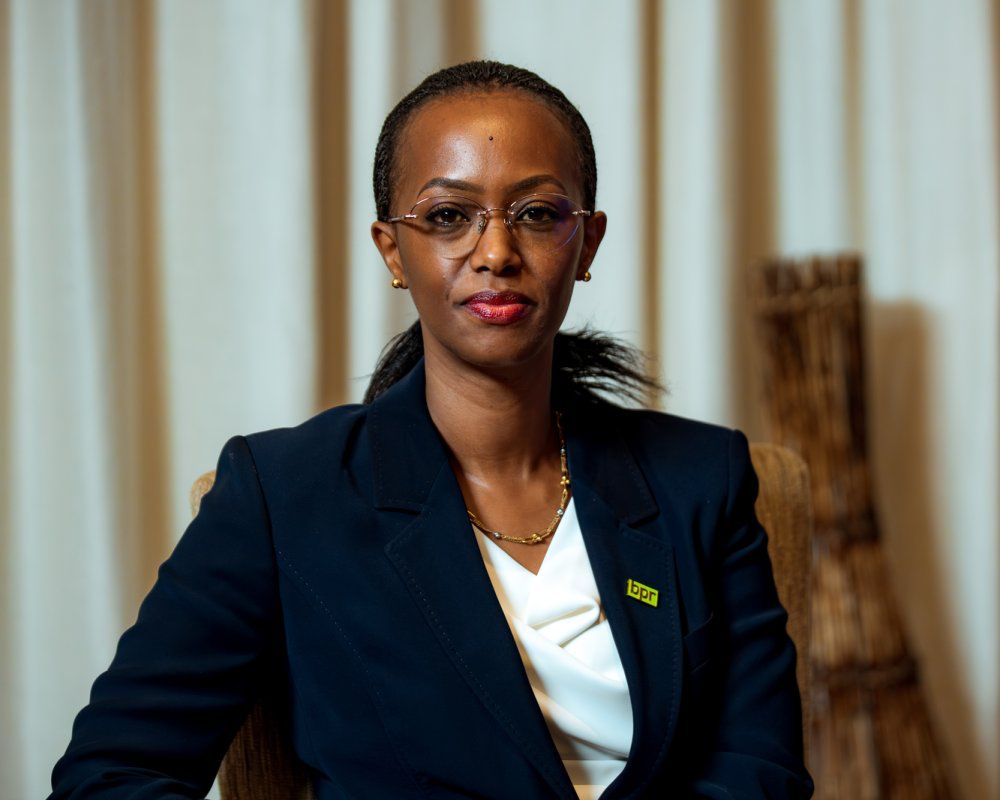The CEO of BPR Bank Rwanda Plc, Mutesi Patience, has revealed that among the things that could keep her awake at night are potential cyberattacks targeting the bank.
She made these remarks in an interview on The Long Form with Sanny Ntayombya, where she discussed several issues, including the acquisition of Rwandan banks such as BPR by foreign investors, describing it as a positive step for Rwanda in attracting investment and deepening financial integration with other countries.
The CEO touched on various topics such as the use of technology and Artificial Intelligence (AI), the sale of local financial institutions, bank loans to startups, the future of banks and telecom companies in the financial sector, among others.
She explained that, in her daily life as a CEO, she often focuses on three main factors that typically keep bank leaders in Rwanda concerned.
She said:
“There are three things that could keep me from sleeping at night. The first is cyberattacks. You can never know when or where a threat might come from, even though we’ve built strong protection systems. Since the BPR merger and since I became CEO, we’ve faced some challenges, though I wouldn’t call them cyberattacks.”
She added:
“The second is loans. We have invested about 90% of our capital in lending, believing that these loans will generate returns, but we can’t fully control all the risks involved. The good thing is that regulations exist to offer protection. Still, the idea that something could go wrong, leading to financial losses and bad debts, is another source of concern.”
The third issue that worries her, she said, relates to employees:
“There are very few skilled professionals in the financial sector. Losing even one key staff member can slow down your investments and operations.”
Mutesi emphasized that to address these challenges, BPR is investing heavily in technology to build a stronger and more resilient banking system.
“The key things I think about every day are technology and its rapid evolution. I must ensure we’re investing in systems that will take our bank to the next level,” she said.
She also stressed the importance of talent development:
“The second priority is talent. How can I ensure that our bank has exceptional people? How can I build their capacity? Investing in attracting, developing, and retaining talented employees is critical, especially in a highly competitive market where skilled professionals are few. I have to make sure they continue to receive support so that they stay and grow with BPR Bank Rwanda.”
As the use of Artificial Intelligence (AI) continues to gain global attention for transforming industries and improving efficiency, Mutesi noted that banks, too, should embrace AI.
She highlighted that banks can use AI for various tasks such as loan decision-making, document verification, and other operational processes.
She confirmed that BPR Bank is exploring how to integrate AI into its operations but acknowledged that many of its clients still prefer face-to-face interactions, which is why the bank continues to maintain an extensive network of branches across Rwanda.
The sale of BPR Bank and the future of banking in Rwanda

When asked whether the sale of Rwandan-owned financial institutions, including BPR Bank Rwanda, to foreign investors should be a cause for concern, Mutesi said there is no reason for worry, especially as Rwanda seeks to become a regional financial hub in Africa.
She explained that the sale of the former Banque Populaire du Rwanda (BPR) led to greater strength and development through its merger and partnership within the KCB Group, which also enabled employee capacity-building and broader growth.
“What we primarily want is a country that is integrated with others. At the moment, we don’t yet have strong financial connections at the regional or international level. When you look at Rwandan banks, most are regional, but not yet globally connected. Whether we like it or not, international banks follow global investors — and those investors, in turn, follow them,” she said.
Mutesi stressed that what truly matters is not who owns the bank, but how the bank’s investments contribute to national development.
“Although BPR Bank was acquired by Kenyans, all major financial decisions are made locally, since most of the executives are Rwandan,” she explained.
“Today, at BPR, no credit-related decision is made outside Rwanda. Out of the nine board members, only two are non-Rwandans. The credit committee has five members, with only one non-Rwandan. Among the top ten executives, only two are non-Rwandan. To me, what matters most is how this money is being used to support Rwanda’s economic growth.”
She noted that 90% of BPR Bank’s investments are in loans, which play a key role in supporting private sector growth, thereby driving Rwanda’s broader economic development.
Statistics show that 96% of Rwandans have access to financial services, but only 22% use traditional banks; the rest rely on mobile money services such as MTN MoMo and Airtel Money.
Mutesi said that banks should strengthen collaboration with telecom companies to make financial services more accessible and convenient, which would help expand the number of bank users compared to mobile-based financial platforms.
According to a report by the National Bank of Rwanda on the country’s economic performance in the first half of 2025, the total value of transactions conducted via mobile phones increased by 58%, reaching 13.659 trillion Rwandan francs.
On the issue of loans, Mutesi pointed out that startups should not rely solely on bank loans, given their limited capacity and high risk. Instead, she called for more initiatives to build the capacity of emerging businesses, helping them grow stronger and more sustainable.
She concluded by emphasizing that banks must invest where they can generate profit, as they manage depositors’ money, which is why startups often find it difficult to access loans in the early stages of their development.





